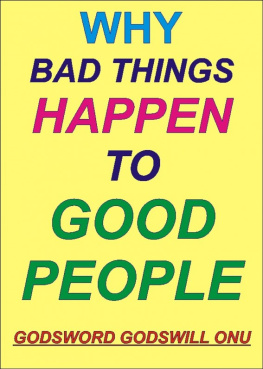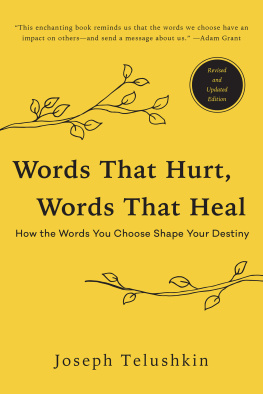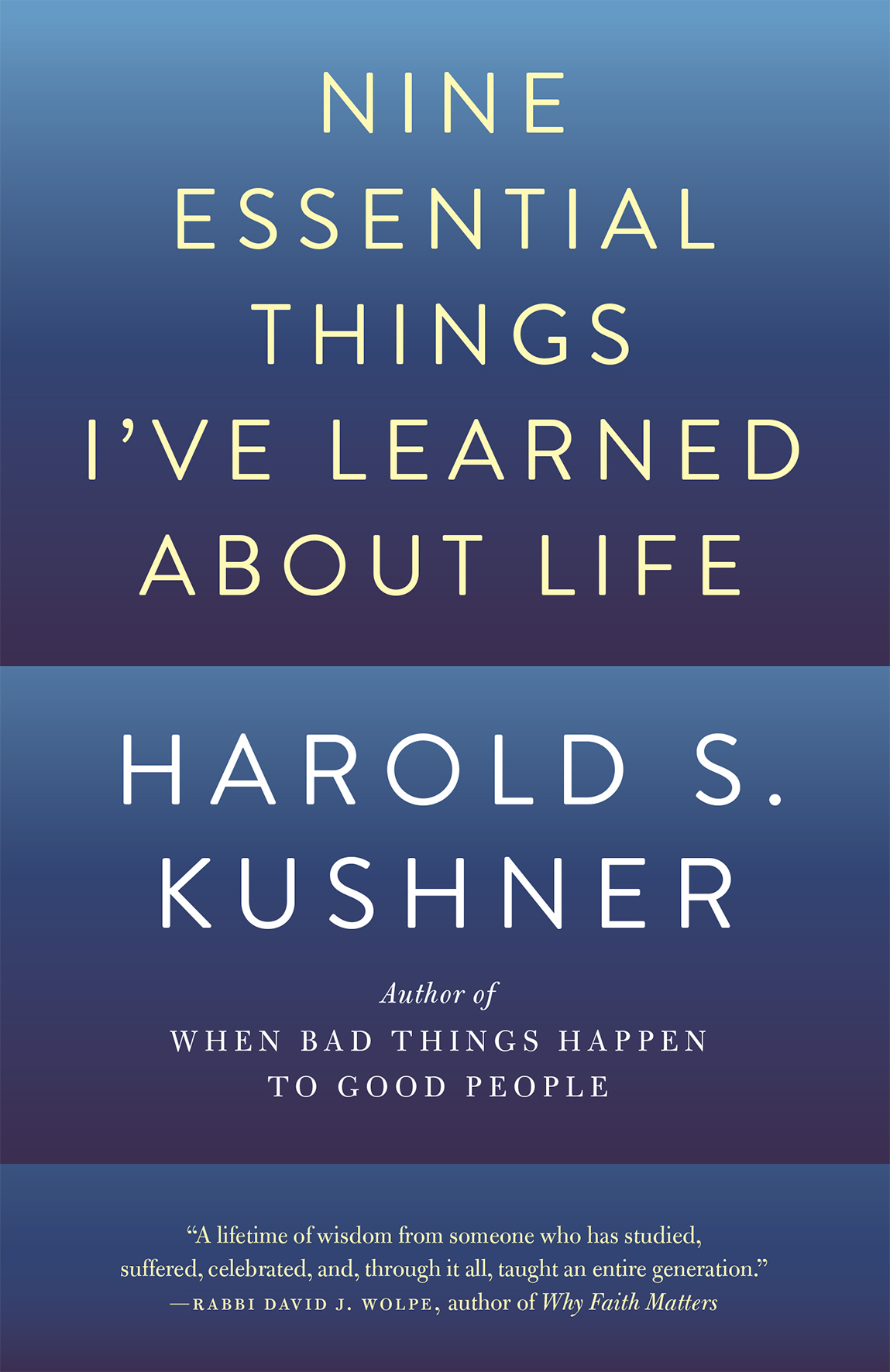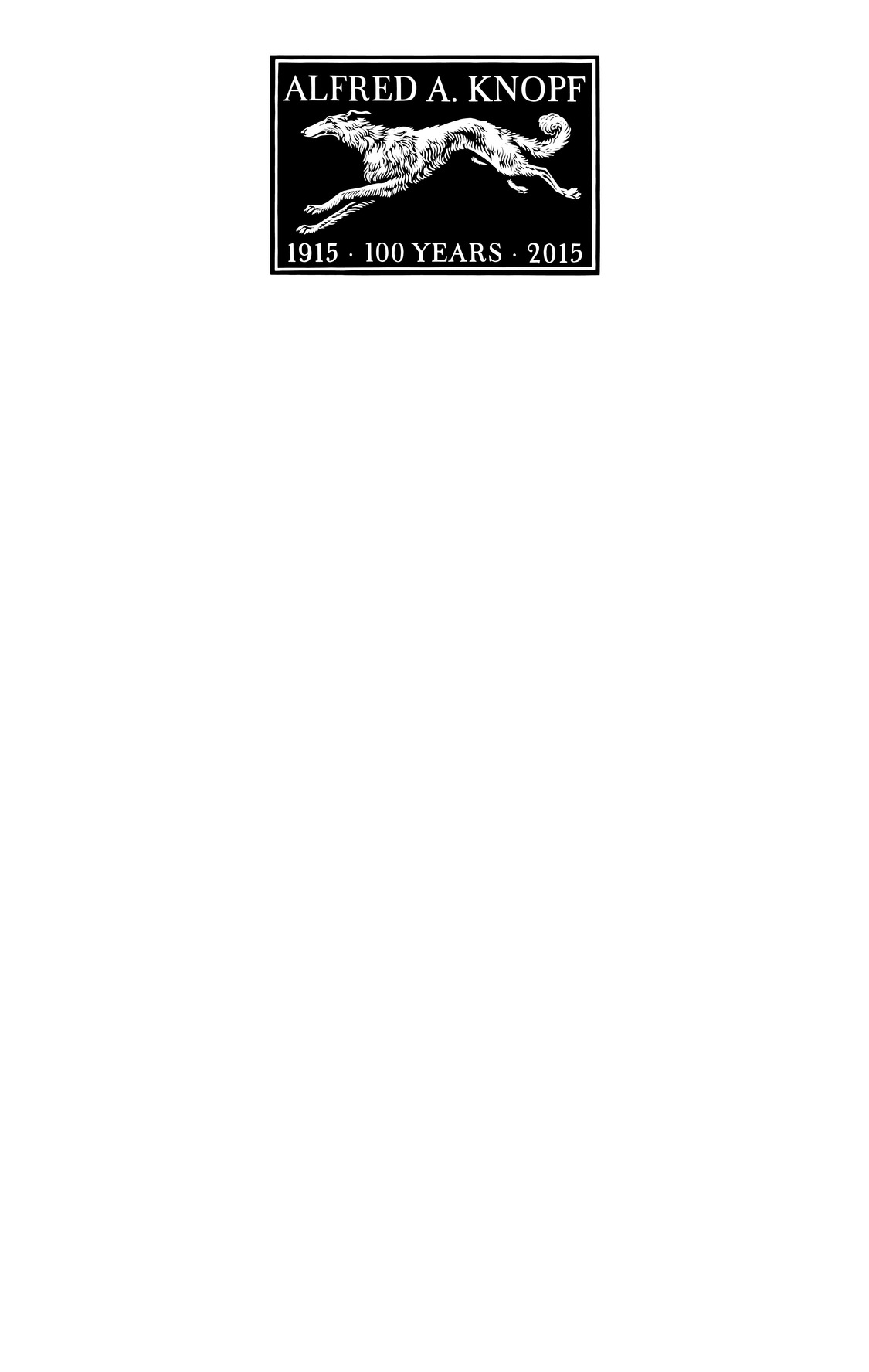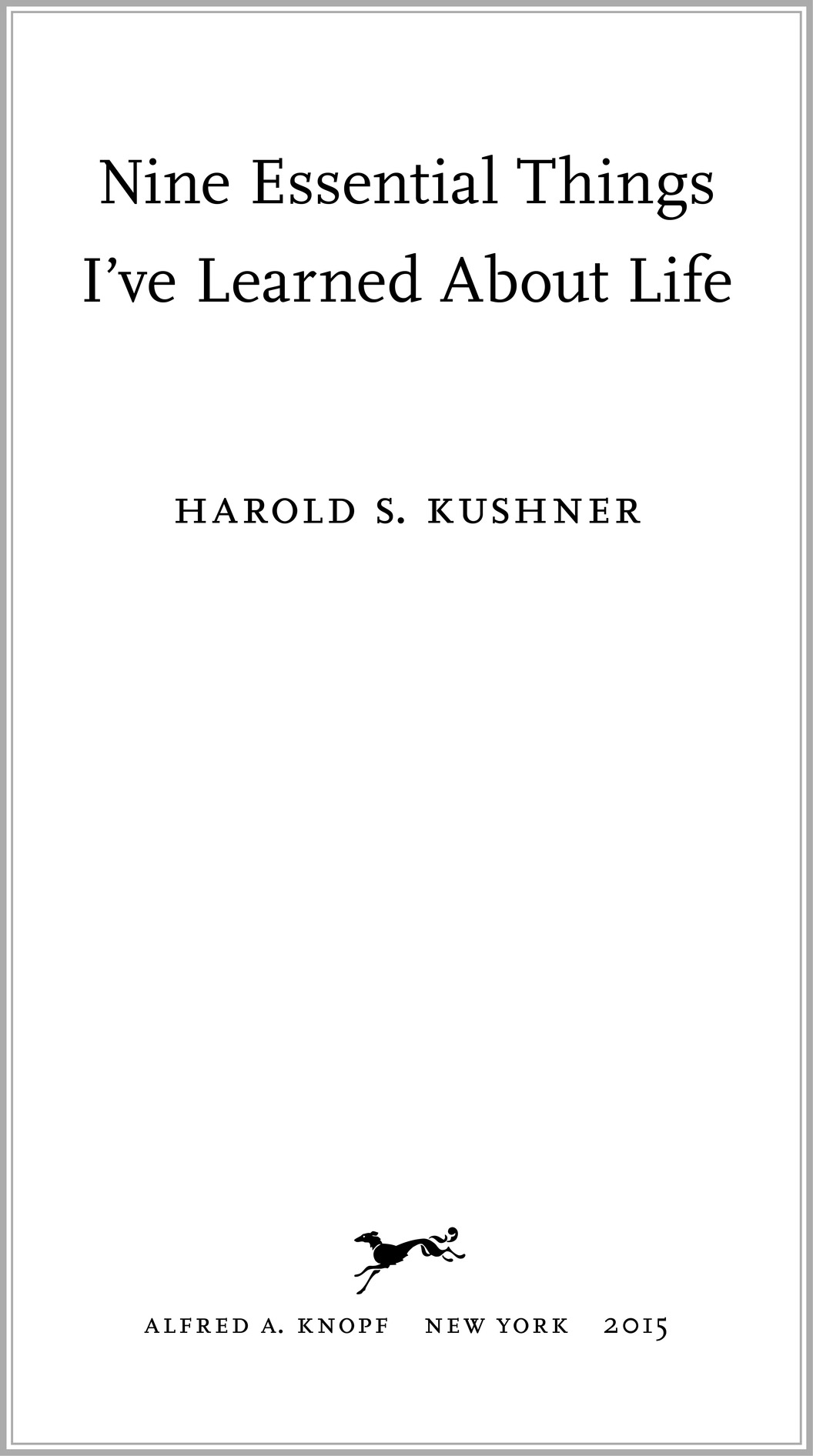ALSO BY HAROLD S. KUSHNER
The Book of Job: When Bad Things Happened to a Good Person
Conquering Fear: Living Boldly in an Uncertain World
Faith & Family: Favorite Sermons of Rabbi Harold S. Kushner
Overcoming Lifes Disappointments
The Lord Is My Shepherd: Healing Wisdom of the Twenty-third Psalm
Who Needs God
Living a Life That Matters: Resolving the Conflict Between Conscience and Success
How Good Do We Have to Be? A New Understanding of Guilt and Forgiveness
When Children Ask About God: A Guide for Parents Who Dont Always Have All the Answers
To Life: A Celebration of Jewish Being and Thinking
When All Youve Ever Wanted Isnt Enough: The Search for a Life That Matters
When Bad Things Happen to Good People
THIS IS A BORZOI BOOK PUBLISHED BY ALFRED A. KNOPF
Copyright 2015 by Harold S. Kushner
All rights reserved. Published in the United States by Alfred A. Knopf, a division of Penguin Random House LLC, New York, and distributed in Canada by Random House of Canada, a division of Penguin Random House Ltd., Toronto.
www.aaknopf.com
Knopf, Borzoi Books, and the colophon are registered trademarks of Penguin Random House LLC.
Library of Congress Cataloging-in-Publication Data
Kushner, Harold S., author
Nine essential things Ive learned about life / Harold S. Kushner.
pages cm
This is a Borzoi bookTitle page verso.
ISBN 978-0-385-35409-7 (hardcover) ISBN 978-0-385-35410-3 (eBook)
1. Self-actualization (Psychology)Religious aspectsJudaism. 2. God (Judaism). 3. Jewish way of life. 4. Spiritual lifeJudaism. I. Title.
BM 729. S 44 K 87 2015
296.7dc23 2014049740
eBook ISBN9780385354103
Cover design by Stephanie Ross
v4.1_r1
ep
Contents
CHAPTER ONE:
CHAPTER TWO:
CHAPTER THREE :
CHAPTER FOUR:
CHAPTER FIVE:
CHAPTER SIX:
CHAPTER SEVEN:
CHAPTER EIGHT:
CHAPTER NINE:
For Suzette, who has made the good times more joyous and the hard times more bearable over so many years
Preface
This book is in part a memoir, a description of the path I followed from adolescence to a career as a rabbi, and of the challenge my wife and I faced when our son was diagnosed with an incurable illness. It is also the story of how organized religion, in all of its branches and formulations, has changed over the course of my lifetime. The religion I teach and practice is very different from the religion I was taught. I blame no one for this change except perhaps the calendar. I was born in 1935. Most of my teachers at rabbinical school had been born in the nineteenth century. Most of my congregants were born in the last third of the twentieth century, and many of their children in the twenty-first. Rethinking religion and theology to address the spiritual needs of that generation has been the defining issue of my rabbinate and underlies much of what I write about in this book.
The credit for much of what is best about this book goes to my editor at Alfred A. Knopf, Jonathan Segal, with whom I have worked on several previous books. He helped me understand what this book should be about and guided me through the process of articulating it. He pointed me toward several key themes and steered me away from more than one blind alley.
A heartfelt word of thanks also to Peter L. Ginsberg of Curtis Brown Ltd. Peter has been with me for almost all of my books, and I would not have been able to write them without his efforts.
I am also deeply grateful to my wife, Suzette, to whom I have dedicated the book, for her encouragement early and late, and for the time and effort she put into reading the manuscript and calling my attention to matters large and small that needed to be changed.
And above all, I am grateful to the Source of all my spiritual insight and understanding, for giving me the ability to recognize where people hurt and giving me the language to ease their pain.
HAROLD S. KUSHNER
Natick, Massachusetts
CHAPTER ONE
Lessons Learned Along the Way
In the twenty-first century, the religious agenda will be set not by traditions answers but by congregants questions.
For thirty years, I had the perfect job. I was a congregational rabbi. I studied, I taught, I officiated at life-cycle eventsbar mitzvah services, weddings, and funeralstrying to enhance the joy and mitigate the sorrow of those moments with my words and with elements of the Jewish tradition, all things I had been taught to do and felt good about doing. (I confess there was one other aspect of being a congregational rabbi that pleased me. I have read that the most frightening thing a person can contemplate, even more than the fear of death, is the fear of having to speak in public. Thats not me. In a room where two hundred people are sitting and listening and one person is standing and speaking, I will always be most comfortable being the one standing and speaking.)
Im not sure how I ended up being a rabbi. It was never my intention growing up. I dont think it ever occurred to me, nor to my parents, who suggested regularly that they would like me to be a doctor. I entered college with no idea of what I would do professionally, hoping that college would give me a direction. My father was a successful businessman, which ruled that out as a career. I did not want to go into business and fail, disappointing my father, nor did I want to go into business and be more successful than my father (a highly unlikely outcome). I have known families in which that engendered not pride but resentment.
I entered Columbia in 1951, listing my major as liberal arts, which left open all possibilities short of medical school. I also took advantage of Columbias proximity to the Jewish Theological Seminary, where my mother had studied to be a Hebrew teacher some twenty-five years earlier and where some of her most revered teachers still taught. The Seminary offered evening classes for students who wanted the education without seeking a career in Jewish professional life.
In those evening classes, I came to recognize four or five familiar faces from my freshman classes at Columbia, and we bonded. We would come back from class and stay up late talking theology, trying to make sense of the Holocaust, details of which had just become widely known, and discussing what the State of Israel, founded just a few years earlier, would mean for Jewish life. Several of those friends were planning to study for the rabbinate, though none of them did. Only I ended up there. After graduating from Columbia in 1955, I enrolled in the Seminarys rabbinical school and emerged five years later as a Conservative rabbi.
My spiritual lifewhat I believe, teach, and practicehas been shaped in large measure by two sets of circumstances. The first was the home I grew up in and the synagogue my family and I attended. The rabbi at the Brooklyn Jewish Center was Israel Levinthal, recognized as one of the outstanding preachers of the American Jewish community. Stories circulated of how Orthodox Jews would walk over the Williamsburg Bridge from the Lower East Side to Brooklyn on Friday nights (as they could not take trains on the Sabbath) to hear Levinthal speak. The quip was that every newly ordained Conservative rabbi would head out to his first pulpit with two books in his luggage: the pocket guide to Jewish practice and the collected sermons of Israel Levinthal. To this day, I cannot sit down to write a sermon without feeling Rabbi Levinthals presence looking over my shoulder to make sure I am being faithful to the text.


